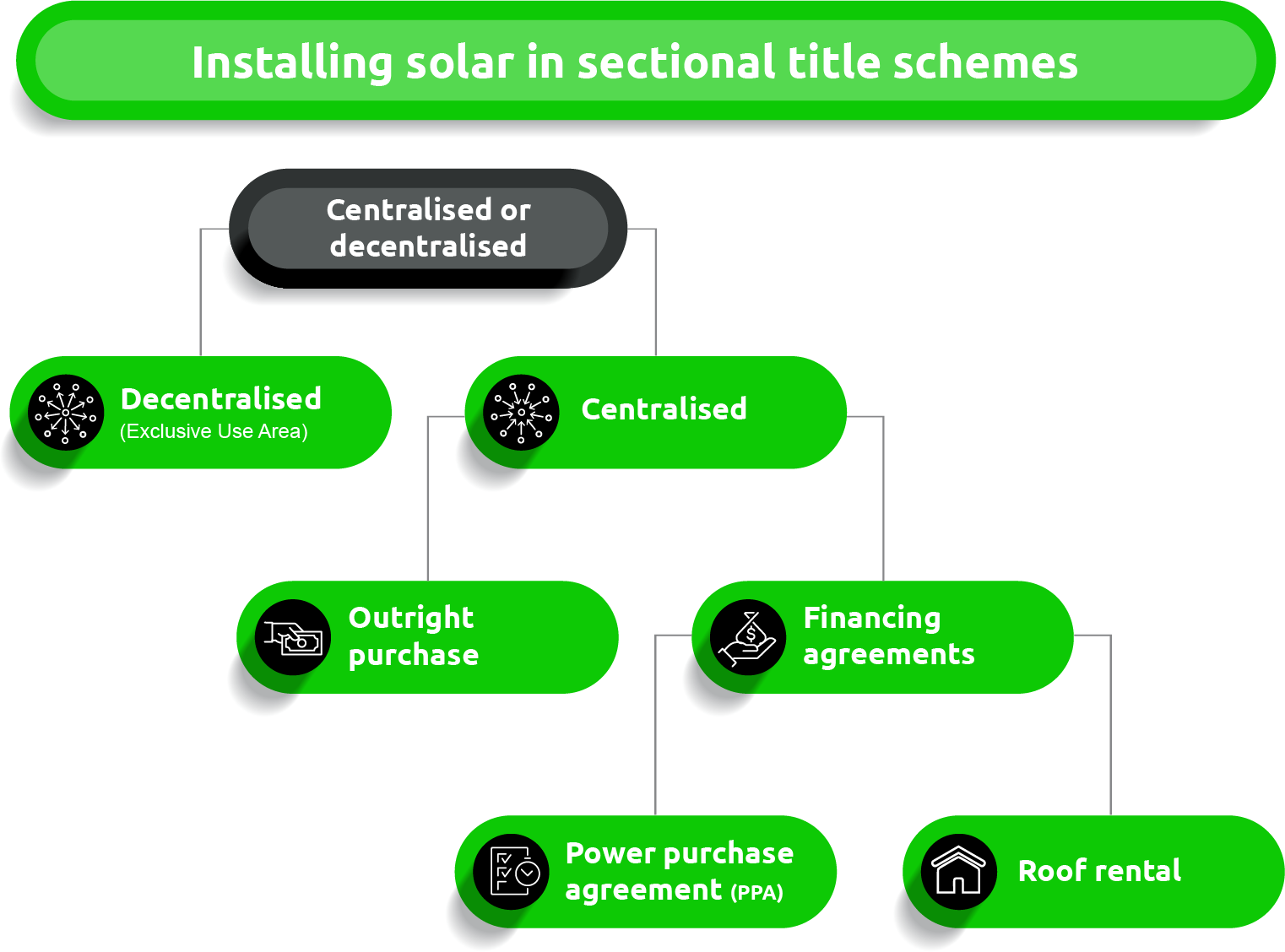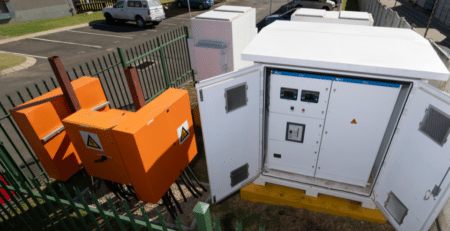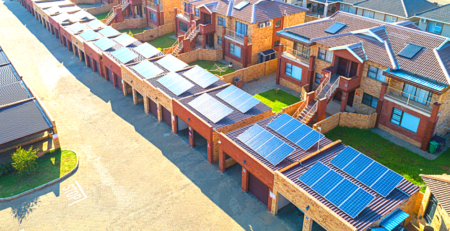Installing solar in sectional title schemes: choosing the right path to sustainable energy

Decentralised
In a decentralised approach, each unit owner installs their own rooftop solar panels. This approach grants unit owners more flexibility and autonomy, potentially making them eligible for tax rebates. However, it’s essential to engage reputable installers and establish clear conduct rules to maintain aesthetics and safety.
Centralised
The centralised approach involves installing a centralised solar system, providing the BC with more control over the installation process and ensuring a high-quality system. However, this approach can be delayed if one or more owners object.
Outright Purchase
Buying the system outright can be accomplished using BC funds from reserves, raising special levies, or securing a project/term loan. STS offers a Project Funding Solution, allowing gradual payments for the system and installation with flexible terms, no hidden fees, and competitive interest rates.
Financing Agreements
Sectional title schemes have two primary financing agreement options for solar panel projects: roof rental and power purchase agreements (PPAs). These agreements enable schemes to access clean and affordable electricity without upfront costs or maintenance responsibilities, eliminating the need for borrowing or using cash reserves.
Power Purchase Agreement
A PPA involves a contract between a solar developer and a sectional title scheme. The solar developer installs and maintains a solar system on the scheme’s common property and the scheme agrees to purchase the generated electricity at an agreed-upon rate, typically lower than the utility’s tariff. Payment is based on usage over a predetermined period, often spanning 10 to 25 years. The solar company bills the BC based on consumption and the BC recovers these costs from the residents. Alternatively, the solar provider may charge a fixed fee for the system’s use and enjoyment.
Roof Rental
Under a roof rental agreement, the BC rents the roof space to a solar developer. The solar service provider installs and maintains the solar panels, selling the generated electricity to the grid or the scheme. The BC receives a monthly rental payment from the solar developer. Special and unanimous resolutions may be required for different rental periods.
Sectional title schemes are increasingly turning to solar power to reduce their electricity bills and environmental impact. With so many options available, it can be difficult to know which approach is best for your sectional title scheme. In this blog post, we will aim to provide insights into the primary approaches for adopting solar power in sectional title schemes.
Decentralised or centralised?
Sectional title schemes can implement solar power either in a centralised or decentralised manner.
1. Decentralised
In a decentralised approach, each unit owner installs their own rooftop solar panels. This approach grants unit owners more flexibility and autonomy, potentially making them eligible for tax rebates. However, it’s essential to engage reputable installers and establish clear conduct rules to maintain aesthetics and safety.
Typically, owners cannot install solar panels on the roof without the body corporate’s (BC’s) consent, which may have its own rules and conditions for such installations. The BC may register exclusive use areas (EUAs) on the roof for each owner based on their participation quota (PQ). This provides owners with the right to use and improve their portion of the roof within specific restrictions.
This solution is very rare in sectional title schemes as the roof area belongs to the BC. This solution is more common in homeowners’ associations where the homeowner owns their own roof.
2. Centralised
The centralised approach involves installing a centralised solar system, providing the BC with more control over the installation process and ensuring a high-quality system. However, this approach can be delayed if one or more owners object.
2.1 Purchase or Finance Agreement
If the BC opts for centralisation, they can either purchase the system outright or enter a financing agreement.
2.1.1 Outright Purchase
Buying the system outright can be accomplished using BC funds from reserves, raising special levies, or securing a project/term loan. STS offers a Project Funding Solution, allowing gradual payments for the system and installation with flexible terms, no hidden fees, and competitive interest rates.
It’s crucial to note that purchasing, installing, and maintaining solar panels and energy storage units can be a substantial expense, particularly for larger sectional title schemes.
It is really important that a system that is purchased is adequately insured and maintained. Solar systems need constant monitoring and regular maintenance to ensure their optimal performance. Maintenance can be outsourced but should not be ignored or neglected.
2.1.2 Financing Agreements
Sectional title schemes have two primary financing agreement options for solar panel projects: roof rental and power purchase agreements (PPAs). These agreements enable schemes to access clean and affordable electricity without upfront costs or maintenance responsibilities, eliminating the need for borrowing or using cash reserves.
ROOF RENTAL
under a roof rental agreement, the BC rents the roof space to a solar developer. The solar service provider installs and maintains the solar panels, selling the generated electricity to the grid or the scheme. The BC receives a monthly rental payment from the solar developer. Special and unanimous resolutions may be required for different rental periods.
Roof rental can be beneficial for schemes with unused roof space that can generate revenue without incurring costs. The scheme may also enjoy lower electricity rates by purchasing some of the generated electricity. However, roof rental may limit future roof alterations or repairs and depends on the solar service provider’s reliability.
POWER PURCHASE AGREEMENT (PPA)
A PPA involves a contract between a solar developer and a sectional title scheme. The solar developer installs and maintains a solar system on the scheme’s common property and the scheme agrees to purchase the generated electricity at an agreed-upon rate, typically lower than the utility’s tariff. Payment is based on usage over a predetermined period, often spanning 10 to 25 years. The solar company bills the BC based on consumption and the BC recovers these costs from the residents. Alternatively, the solar provider may charge a fixed fee for the system’s use and enjoyment.
Ownership of the solar facility may or may not transfer to the sectional title scheme at the end of the term, depending on the contract’s structure.
What Does STS Offer?
STS, in collaboration with Bright Light, provides sectional title schemes with a unique PPA option called the Electricity Services and Supply Agreement (ESSA). The ESSA is highly flexible and can be customised to each sectional title scheme’s requirements, offering cleaner and more affordable energy solutions. For example, schemes can choose ESSA terms ranging from 10 to 25 years. Importantly, the ESSA has no hidden fees or charges, with the only cost being electricity consumption. It also includes a comprehensive warranty covering installation, insurance, maintenance, and repairs.
To switch to solar using the ESSA, sectional title schemes need to contact STS or Bright Light with their energy needs and current utility bills. Our solar specialists will then conduct a feasibility study to assess solar viability. Afterwards, we design an optimal solar solution based on energy requirements and provide a tailored proposal.
Subject to the applicable tariff, STS and Bright Light also offer battery storage solutions. In many cases, these solutions can be provided at no additional cost to the BC or residents, and residents can enjoy energy security at no additional cost or risk. Please contact us for further details.
Conclusion
Solar power presents an attractive solution for sectional title schemes looking to reduce costs and environmental impact. However, selecting the best approach requires careful consideration of costs, benefits, and risks. Regardless of the chosen option, community support and expert guidance are essential for success.
Our Solutions Consultants are readily available to assist with any questions or concerns regarding efficient energy solutions for your community scheme. Contact us today to embark on your journey toward adopting solar power and battery storage solutions. Together, we can make a positive impact on your quality of life, the environment and your finances.





